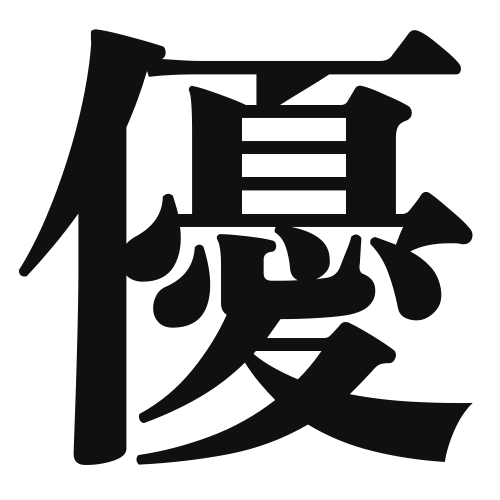1. Overview of Meaning
The kanji “優” (yū) means “superior,” “gentle,” or “excellent.” It conveys a sense of grace and high quality, often associated with kindness and elegance.
2. Formation and Radical
Formation of the Kanji: The kanji “優” is a phonetic-ideographic character (形声文字). It combines the radical for “sheep” (羊) which symbolizes gentleness, with the phonetic component “you” (悠), suggesting a sense of calmness and superiority.
Radical: The radical of “優” is 羊 (sheep), which often relates to gentleness and softness in kanji.
3. Examples of Usage
Common Words and Phrases:
- 優れた (すぐれた, sugureta) – excellent
- 優雅 (ゆうが, yūga) – elegance
- 優先 (ゆうせん, yūsen) – priority
Example Sentences in Daily Conversation:
- 彼は優れた選手です。 (かれはすぐれたせんしゅです。) – He is an excellent player.
- このデザインはとても優雅です。 (このデザインはとてもゆうがです。) – This design is very elegant.
4. Synonyms and Antonyms
Similar Kanji:
- 上 (じょう, jō) – meaning “above” or “top,” which conveys a sense of superiority but lacks the gentleness associated with “優.”
- 優秀 (ゆうしゅう, yūshū) – meaning “excellent” or “outstanding,” which is closely related but emphasizes skill or talent.
Antonyms:
- 劣 (れつ, retsu) – meaning “inferior,” which directly contrasts with the meaning of “優.”
- 悪 (あく, aku) – meaning “bad,” which represents a negative quality opposed to the positive connotation of “優.”
5. Cultural and Historical Background
Relation to Japanese Culture: The concept of “優” is deeply embedded in Japanese culture, where qualities like gentleness and excellence are highly valued. It is often used in contexts that emphasize harmony and respect.
Proverbs and Idioms:
- 優しさは強さ (やさしさはつよさ, yasashisa wa tsuyosa) – “Kindness is strength,” highlighting the importance of gentleness in strength.
- 優れた者は優れた者を知る (すぐれたものはすぐれたものをしる, sugureta mono wa sugureta mono o shiru) – “The excellent recognize the excellent,” emphasizing the appreciation of quality.
